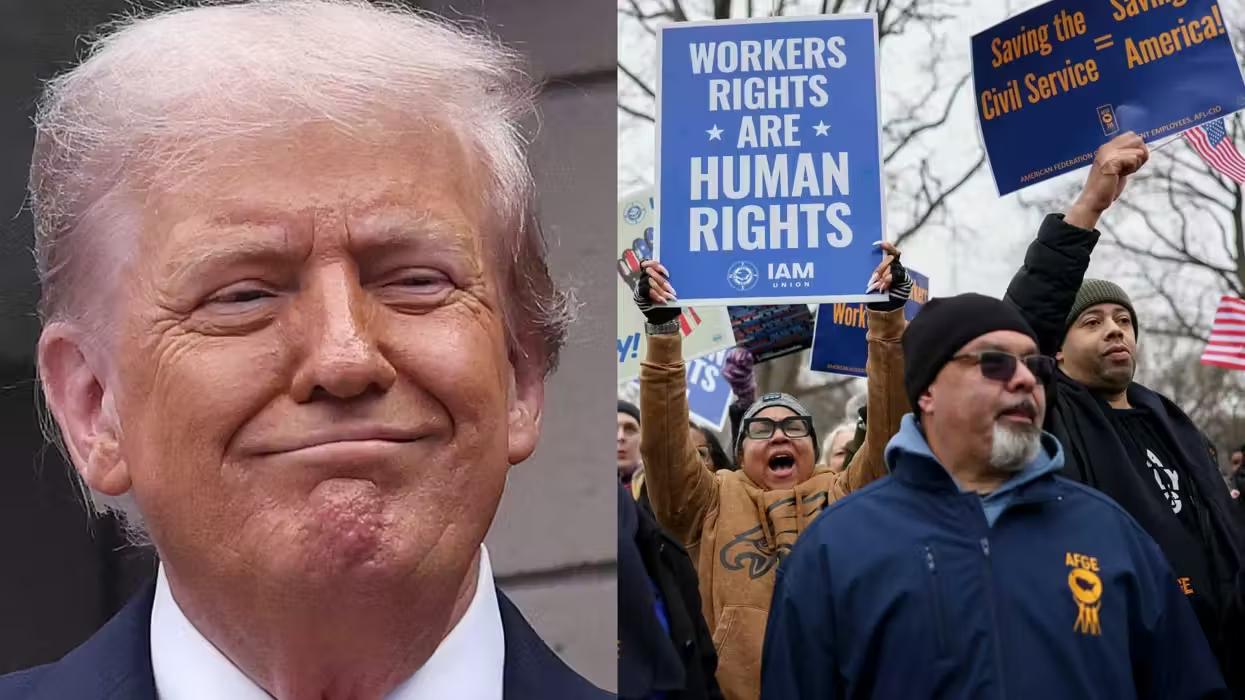
© 2025 Blaze Media LLC. All rights reserved.
Some lawmakers want to expand gun background checks, but how well does the current system work?
September 25, 2019
A lot of the recent gun control discussion in Washington, D.C., has focused on expanding background checks for gun purchases under federal law. But how well is the current law being enforced?
In 1993, Congress passed the Brady Handgun Violence Prevention Act — also colloquially referred to as the Brady bill — which mandated the creation of the National Instant Criminal Background Check System or NICS, which is the massive database used for gun background checks.
In a transaction where a background check is required, a prospective gun buyer has to fill out a form that asks a series of questions regarding his or her eligibility to buy a firearm under federal law. These include questions about the prospective buyer’s criminal history, drug use, immigration status, and mental health history.
While it is indeed a federal crime for a “prohibited person” to buy or possess a gun, simply lying in the process of obtaining a firearm is also a federal offense punishable by up to 10 years in prison and/or a maximum $250,000 fine. It says so right at the top of the form.
And, while illegal, it’s possible for someone to “lie and try” on the form to see if they can skirt the background check. However, when compared to the total number of NICS denials, the number of “lie and try” prosecutions and convictions has been noticeably small.
A report on the 2010 Justice Department data from the Regional Justice Information Service found that, in that year there were just under 73,000 NICS denials, but only 62 charges were referred to prosecutors. Those yielded 13 guilty pleas. A DOJ inspector general report from 2016 found that “the number of NICS denial prosecutions has dropped substantially since Fiscal Year 2003, when 166 subjects were accepted for consideration of prosecution.”
A Government Accountability Office (GAO) report published in 2018 found that, during FY 2017, 112,090 NICS denials resulted in 12,170 field investigations and 12 prosecutions. As an enforcement challenge, ATF officials told the GAO that following up on these cases "has been time intensive and required use of their limited resources” while officials from the Executive Office for United States Attorneys told the agency that “prosecuting denial cases can require significant effort and may offer little value to public safety compared to other cases involving gun violence.”
In contrast to the federal numbers, the GAO report offers the case study of three states — Oregon, Pennsylvania and Virginia — that “investigate a high proportion of firearms denials.” In 2017, for example, around 5,500 denial cases were referred for investigations in Pennsylvania; that resulted in 1,907 referrals for prosecution and 472 convictions.
Some pro-gun lawmakers see the disparity as a counter argument against calls to expand the background check requirements currently on the books.
In an interview last week with Blaze Media, Second Amendment Caucus Chair Thomas Massie, R-Ky., said that the disparity between denials, prosecutions and convictions in the 2010 enforcement numbers were an indication that the current background check system is “broken.”
“Why would you expand a program that doesn’t work?” Massie said of the NICS system. “That’s the real question.”
The congressman went on to say that he suspects “real reason they’re not prosecuting these denials is because they’re false denials.”
While there’s not much information out there to tell us what percentage of NICS background check denials are false positives, Crime Prevention Research Center President John Lott’s research has placed it somewhere in the mid-to-high 90s.
House Freedom Caucus Communications Chair Jody Hice, R-Ga., also sees problems with expanding the current background check, given the data.
“You have a tragedy that takes place in our country, immediately people start screaming ‘do something, do something, do something’” Hice explained. “Why don’t we do something like trying to enforce the laws that we already have?”
Citing the 2010 enforcement numbers, Hice said, “There’s obviously an enormous problem that this whole background check system that we currently have is not working.”
“So what is Congress’ solution to that?” Hice asked. “Let’s go back and expand it; let’s make this even bigger. That is not the way to address this problem.”
The “lie and try” issue has received increased attention in recent years from the Trump administration’s Justice Department.
As part of a list of actions following the 2018 school shooting in Parkland, Florida, then-Attorney General Jeff Sessions called for increased prosecution of lie and try cases.
“Criminals and other prohibited persons who attempt to thwart the background check process by lying on the required forms threaten to undermine this important crime prevention tool,” Sessions wrote in a corresponding memo to U.S. attorneys. “Such conduct cannot be tolerated. We must vigilantly protect the integrity of the background check system through appropriate prosecution of those who attempt to circumvent the law.”
At a June gathering of U.S. attorneys, Attorney General William Barr called for “vigorous enforcement of the background-check process, both against prohibited persons who ‘lie and try’ and against firearm dealers who skirt the process.”
He added, “We need to provide real deterrence.”
Blaze Media reached out to the Department of Justice to find how "lie and try" enforcement has changed since the Sessions memo and was referred to the Bureau of Alcohol, Firearms, Tobacco and Explosives (ATF).
“Because this is a priority of the Attorney General’s Office this is also a priority for the ATF,” an ATF spokeswoman told Blaze Media.
The spokeswoman said that she didn’t have numbers available on background check enforcement since the 2018 Sessions memo, but said, “Since the memo we have seen an enhancement of cases, are investigating those, & referring the appropriate ones for prosecution.”
The spokeswoman also added, “We have always focused on the most violent criminals and those with guns pose the most danger.”
#mc_embed_signup{background:#fff; clear:left; font:14px}
/* Add your own MailChimp form style overrides in your site stylesheet or in this style block.
We recommend moving this block and the preceding CSS link to the HEAD of your HTML file. */
Want to leave a tip?
We answer to you. Help keep our content free of advertisers and big tech censorship by leaving a tip today.
Want to join the conversation?
Already a subscriber?
more stories
Sign up for the Blaze newsletter
By signing up, you agree to our Privacy Policy and Terms of Use, and agree to receive content that may sometimes include advertisements. You may opt out at any time.
Related Content
© 2025 Blaze Media LLC. All rights reserved.
Get the stories that matter most delivered directly to your inbox.
By signing up, you agree to our Privacy Policy and Terms of Use, and agree to receive content that may sometimes include advertisements. You may opt out at any time.






